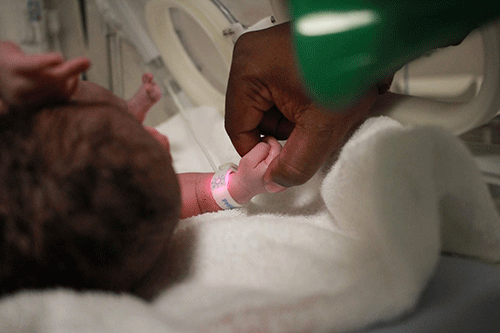Delayed health-seeking causes premature birth
 Delayed health-seeking behaviour by some expectant mothers, who present themselves late at health facilities and delay in attending antenatal care are some of the reasons for the rising number of premature births in Namibia.
Delayed health-seeking behaviour by some expectant mothers, who present themselves late at health facilities and delay in attending antenatal care are some of the reasons for the rising number of premature births in Namibia.
This was announced by health ministry’s executive director Ben Nangombe yesterday while remembering World Premature Day.
He also mentioned there are those mothers who choose to deliver at home and only go to the hospital with a baby in a poor state of health, which often results in unfavourable outcomes.
World Prematurity Day is observed on 17 November each year to raise awareness of preterm birth and the concerns of preterm babies and their families worldwide.
In a country where 54% of neonatal deaths are due to prematurity and low birth weight, Namibia is committed to reducing the maternal mortality ratio to 200 per 100 000 live births and the neonatal mortality ratio to 10 per 1 000 by 2022.
“Through programmes such as Maternal and Perinatal Death Surveillance and Response or Maternal and Newborn Care Collaborative Initiative and Review Committees, the ministry and its partners have shown their commitment to improving the lives of mothers and newborns throughout Namibia,” shared Nangombe.
He encouraged parents with premature babies, who have or are struggling in this journey, to keep the faith, keep going and invest in the lives of their children – and that government is doing its best to amplify and improve the healthcare system.
“Neo-natal units at our district hospitals are equipped with a fair number of modern equipment, such as incubators, baby warmers, ventilators, CPAP (for smaller and bigger babies), phototherapy units, cot beds, pulse oxymeters, and others,” said Nangombe.
The Windhoek Central Hospital has about 35 beds for preterm babies; at Rundu Maternity Hospital, also about 35 babies can be accommodated in an intensive care setting.
At Katima Mulilo, about 12 babies can be accommodated, and the new unit being set up will accommodate more than 20 babies.
Nangombe added: “The unit will also be fitted with appropriate equipment to enable mothers to do what is known as kangaroo care. The ministry is in the process of improving ICU capacity at selected district hospitals. This will also strengthen capacity for neonatal care.”
The World Health Organisation says an estimated 15 million babies are born too early every year, which constitutes more than one in 10 babies.
Approximately one million children die each year due to complications of preterm birth.
Many survivors face a lifetime of disability, including learning disabilities and visual and hearing problems.
More than three-quarters of premature babies can be saved with feasible, cost-effective care, such as essential care during childbirth and in the postnatal period for every mother and baby, provision of antenatal steroid injections.
Nangombe admitted these types of healthcare services and the improvement of the healthcare system are not cheap.
“Improved medical and nursing care is expensive. It is possible that the tiniest patients potentially consume a large portion of the allocated health care budget,” he said.
source: https://neweralive.na/posts/delayed-health-seeking-causes-premature-birth









